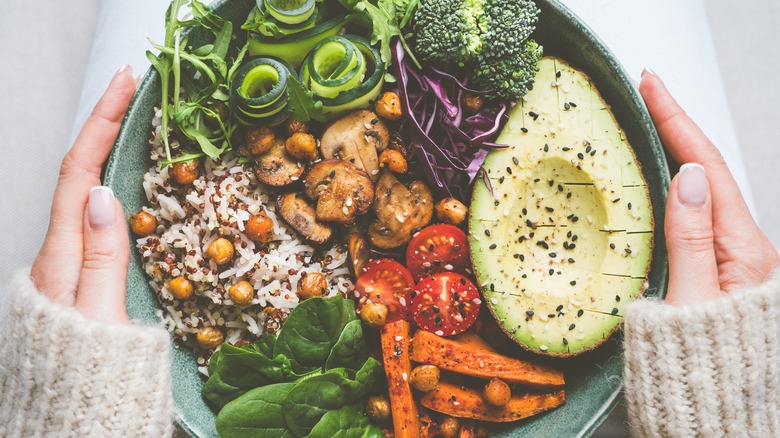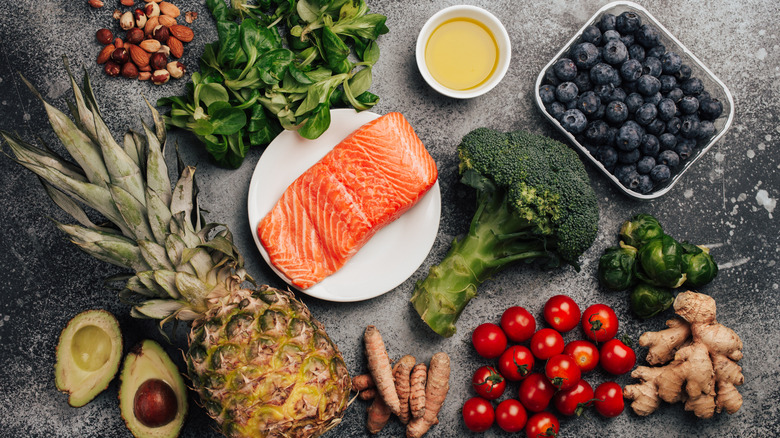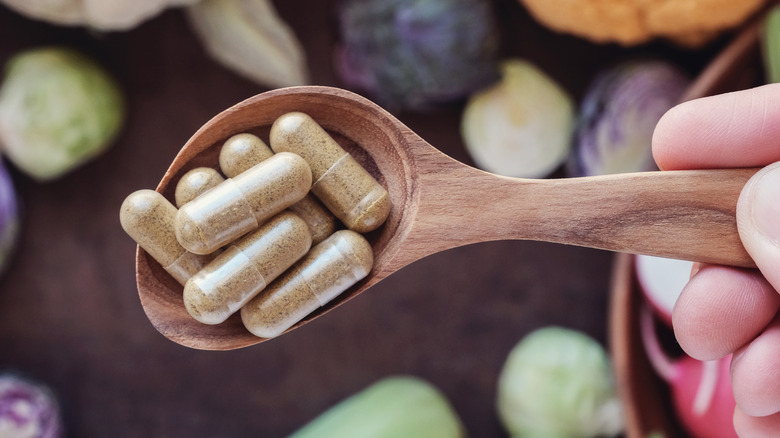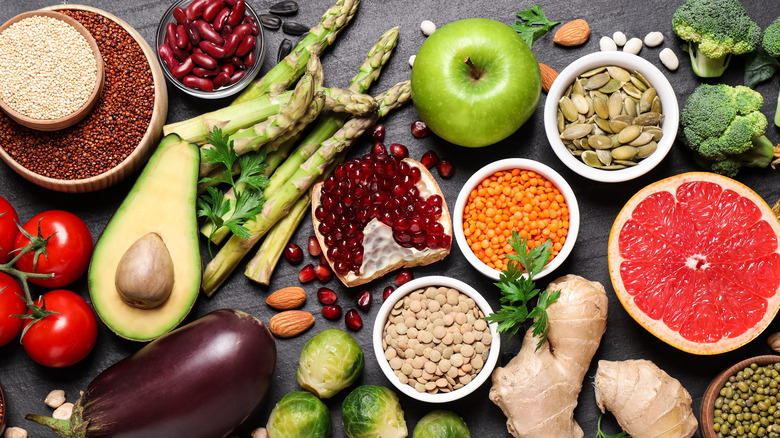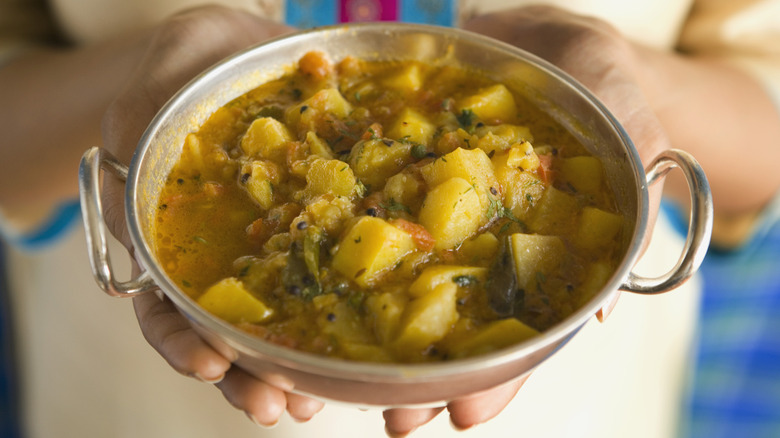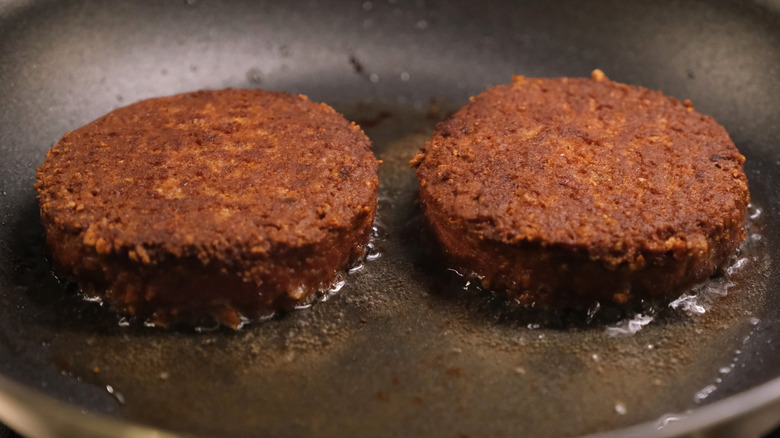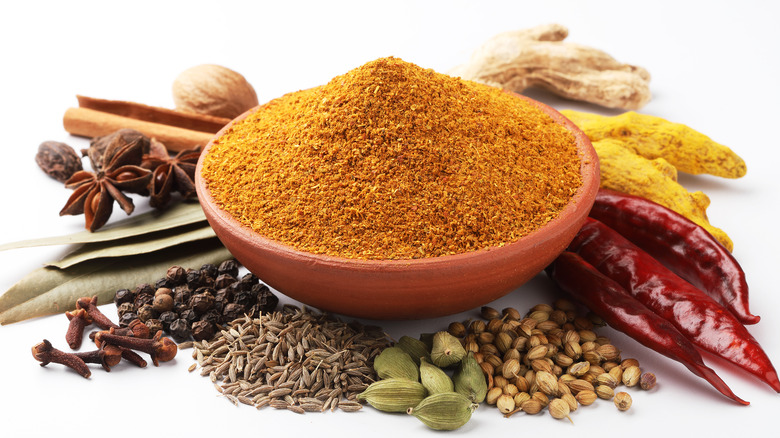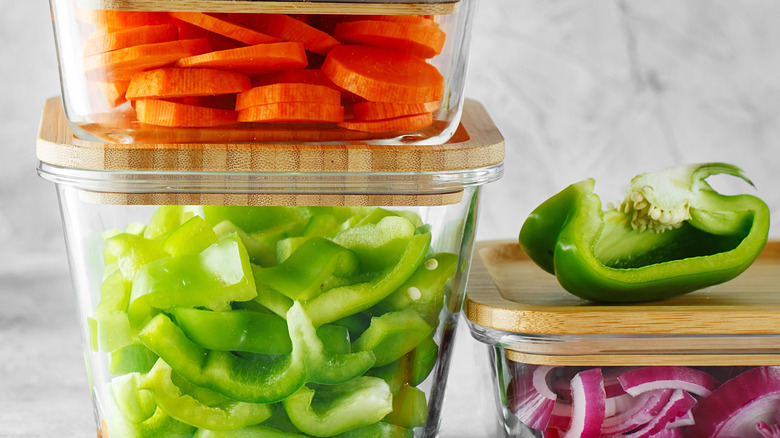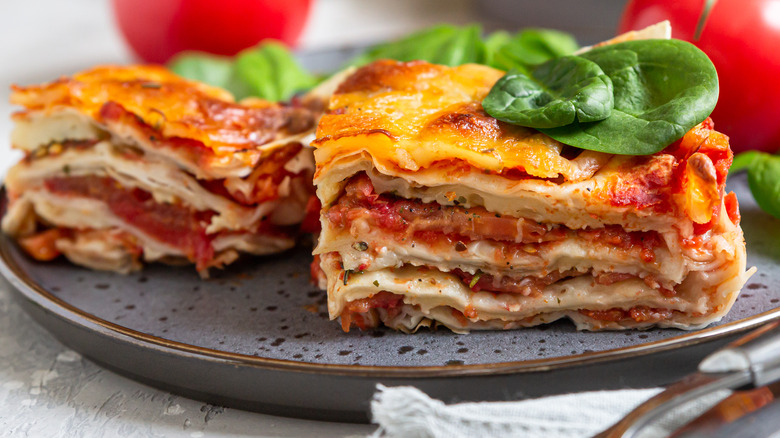The Complete Beginners Guide To A Vegetarian Diet
When people choose to follow a strict vegetarian diet, they decide not to eat meat of any kind, per The Vegetarian Society of the United Kingdom. This means no beef, no pork, no poultry and no fish. They also cut out foods that contain animal-based ingredients like chicken and beef stock or broth and gelatin. Vegetarians who live in places where insects are consumed also remove them from their diets.
However, the moniker vegetarian is kind of misleading, because vegetarians don't subsist solely on vegetables. They eat a wide variety of foods that don't contain meat, including grains of all kinds, legumes, seeds, nuts, eggs, dairy products, honey, and, of course, lots of fruits and vegetables. Some people choose not to follow a strict vegetarian diet, per Harvard Health, but choose to eliminate most, not all, animal products. Others choose to be vegan, which involves cutting out any foods that are derived from animals.
Going vegetarian is a very individual choice, made for a variety of reasons. Some people choose to cut out animal products to improve their health, while others choose to go vegetarian for ethical reasons like advocating for animal welfare and protecting the environment. For many people, the decision is based on a combination of health and ethical motivations. Whatever the reason, choosing a vegetarian lifestyle can seem overwhelming — but it doesn't have to be. Here's what you need to know before you get started.
Different kinds of vegetarians
If you're interested in vegetarianism, the first thing you should know is that there are so many different ways to be vegetarian! The label "vegetarian" is actually an umbrella term that describes a lot of ways to reduce, cut out, or completely eliminate animal products and foods derived from animal products, per Well+Good.
The classic vegetarian is someone who doesn't eat any meat, but still chooses to eat foods derived from animals like milk, cheese, and eggs. They may also eat foods with animal products in them like gelatin and honey, which distinguishes them from lacto-ovo-vegetarians, vegetarians who eat dairy and eggs, but no meat or foods with animal products. Then there are the lacto-vegetarians, who eat dairy products but won't eat eggs, and the ovo-vegetarians, who eat eggs but not dairy products.
On the more lenient side of vegetarianism are the pescatarians, people who choose to eat seafood but no other meat, and the flexitarians, people who are vegetarian the majority of the time, but will eat meat every once in a great while. In contrast, the strictest vegetarians are vegans and raw vegans. Vegans don't eat anything that once was or came from an animal, and raw vegans literally only eat raw, plant-based foods.
Some people start their vegetarian lifestyle with a more lenient version of vegetarianism like flexitarian or pescatarian, and slowly work their way to classic vegetarianism or lacto-ovo-vegetarianism.
Plant-based diets
Lately, a lot of people have been talking about adopting "plant-based" diets. According to Men's Health, it's hard to determine exactly what people mean when they say plant-based, because people use the term for different styles of eating.
Registered dietitian Nicole Rodriguez told MindBodyGreen that a lot of people consider themselves plant-based if they prioritize fruits, vegetables, and legumes over other kinds of foods. They may still eat meat on a fairly regular basis or just occasionally, but they strive to eat more plant-based foods than animal or animal-derived products. For these people, plant-based seems to be the trendy rebrand of flexitarian.
However, some people who follow some version of a vegetarian or vegan diet still call themselves plant-based instead of vegetarian or vegan. Though there are many reasons someone may choose not to use the words vegetarian or vegan to describe themselves, vegan dietitian Sarah Skovran told Men's Health that some people prefer plant-based because they're vegetarian or vegan for health reasons and not ethical reasons. For many, saying they're plant-based is a way to avoid the assumptions — either about what they eat or what they believe — that come with calling themselves vegetarian or vegan.
So, if you're interested in adding more fruits, vegetables, legumes, nuts, and grains to your diet, go ahead and call yourself plant-based! But if you're having a plant-based friend over for dinner, be sure to ask them exactly what they mean by that before you plan a meal.
Vegetarianism and animal welfare
One of the primary reasons that people choose to become vegetarians is because they are morally and ethically opposed to harming animals. According to Stanford Encyclopedia of Philosophy, "moral vegetarians" — people who choose to become vegetarians at least partially because of their belief systems — believe that raising and slaughtering animals to make meat products is animal cruelty.
Many of these "moral vegetarians" point out that animals are also being constantly and consistently harmed by unethical farming practices. Research into modern farming practices has revealed that the animals raised for the purpose of creating meat products are often kept in unsafe and unsanitary conditions. Some animals are packed into pens so close together that they can barely move. Many of those animals have limited access to the outdoors, their natural habitat. And when they're indoors for so long, too close to each other, diseases spread quickly.
Additionally, many of the animals aren't fed an appropriately nutritious diet. They're fed a specific diet aimed at fattening them up to produce more meat. Often, this diet includes antibiotics, so they don't get sick because they're so tightly packed in their pens and hormones. The sole purpose of the hormones is to produce more meat quicker, so the animals can be slaughtered sooner.
Vegetarians believe that by eating meat, people are contributing to the unethical farming practices behind meat production and the slaughter of animals, who they believe have rights as sentient beings.
Vegetarianism and the environment
Another moral and ethical reason why some people choose to become vegetarians is that they believe that industrial agriculture and the meat processing industry are harming the environment. According to the Columbia Climate School, the science supports these beliefs.
Industrial agriculture has a massive impact on the environment. Fertilizers used in industrial agriculture produce harmful levels of carbon dioxide and methane emissions. On its own, agriculture produces nearly 20% of the greenhouse gas emissions in the United States. Industrial farming is also one of the factors driving water shortages throughout the U.S., and agriculture causes nitrogen runoff that pollutes natural water sources. Maureen Raymo, a paleoclimatologist at Columbia, stated that a vegetarian diet is much better for the environment, and if more people became vegetarian, the environmental impact would be significant.
However, some argue that the shifts in the food system required to support large scale vegetarianism would essentially negate the benefits. In a CNN op-ed, Wayne Martindale, a Senior Research Fellow in Corporate Social Responsibility at Sheffield Hallam University, posited that the additional emissions from vehicles used to transport fruits and vegetables across the globe could match the emissions produced by agriculture. He also argued that the land clearing necessary for fruit and vegetable production, especially in the rainforest, could cause an equal amount of damage to the environment as agriculture.
It's not quite clear yet whether vegetarianism will create a net benefit for the environment, but millions of environmentally conscious people choose vegetarianism because they believe it will make a difference.
The health benefits
Some people who choose a vegetarian diet don't do so for moral or ethical reasons. They become vegetarian for the myriad health benefits. In fact, research suggests that going vegetarian can improve people's physical and mental health in a variety of ways.
For instance, Harvard Health states that eating more fruits and vegetables has been linked to a reduced risk for heart disease and cancer. Studies have found that vegetarians tend to be healthier overall as well. Vegetarians often have lower blood pressure and cholesterol numbers than people who regularly consume meat, perhaps because they tend to consume fewer foods that are high in saturated fats and cholesterol. Because their diet is heavy in a variety of fruits, vegetables, nuts, and legumes, vegetarians often get more essential vitamins and minerals than meat eaters. However, there are a few vitamins and minerals a typical vegetarian diet lacks, and some vegetarians do develop deficiencies.
One study published in the International Journal of Environmental Research and Public Health found that vegetarianism may have a significant impact on mental health as well. Participants were given a standard survey to assess individual measures that contribute to quality of life. the results showed that people who adopted a vegetarian lifestyle reported improved mental health because they felt they were doing something good for the world, they found community with other vegetarians, and their health improved.
Potential health risks and how to manage them
Though being vegetarian has numerous health benefits, WebMD points out that there can be some minor risks. Some studies suggest a vegetarian diet, especially a stricter vegan diet, may be associated with stroke, a decline in brain health, hair loss, and mood changes. However, Dr. Qi Sun, a researcher and nutrition professor at Harvard, and Liz Weinandy, a registered dietitian, both told WebMD that these findings are likely caused by vitamin deficiencies that can result from a strict vegetarian diet.
The American Dietetic Association (ADA) acknowledges that vitamin and mineral deficiencies can occur in people following a strict vegetarian or vegan diet. The most common deficiencies that occur are vitamin B12, zinc, vitamin D, calcium, iron, and specific essential fatty acids deficiencies. However, the ADA states that these deficiencies typically only occur when people aren't aware of what foods to eat to get sufficient amounts of those vitamins and minerals. The organization provides a list of vegetarian foods that can easily be added to any vegetarian's diet to avoid vitamin and mineral deficiencies.
So, if you include a wide variety of vitamin and mineral-rich foods to your diet, it's easy to avoid the potential risks of going vegetarian.
Do vegetarians need to take supplements?
Though a well-planned vegetarian diet that includes a wide variety of foods can provide all the nutrients, vitamins, and minerals you need, some people find it difficult to make their vegetarian diets nutritionally complete. Registered dietician and Nordic Naturals contributor Kate Turner states that supplements can help fill in the nutritional gaps that some people develop when they go vegetarian.
She explained that there are multiple reasons why it's difficult to get all the vitamins, minerals, and nutrients we need from a vegetarian diet. For example, vitamin B12 only naturally occurs in a few plant-based foods. Many vegetarian-friendly foods add vitamin B12 during processing, but it's still hard to get enough from plant-based food sources. Additionally, vegetarian diets are often high in phytates, which can hinder the absorption of iron and zinc.
Rene Ficek, a registered dietitian and nutrition expert at Seattle Sutton's Healthy Eating, told Prevention that most people can find the right combination of vegetarian friendly foods to meet all their nutritional needs. However, it's important to communicate with your doctor about your diet if you feel like something is off. Symptoms like fatigue, weakness, sleep trouble, and mood swings can all indicate a potential vitamin deficiency.
If you're not getting everything you need from the foods you eat, it's absolutely fine to take a supplement. Just remember that a supplement isn't a substitute for a varied diet, especially for vegetarians and vegans.
Creating a nutritionally balanced vegetarian diet
When you're cutting any kind of food out of your diet, for any reason, it's always important to focus on what you can add to create a nutritionally balanced diet. According to Johns Hopkins Medicine, when people first cut out meat, many of them aren't sure what to eat. As a result, they start consuming more carbohydrates, sugars, fat, and processed foods instead of more plant-based foods. Yes, cheese pizza, french fries, and pasta are all vegetarian — and an awesome part of a balanced diet — but they can't be the basis of a vegetarian diet just because they're meatless.
The Mayo Clinic suggests building each meal around fruits, vegetables, and whole grains, then adding some dairy (if that's part of your vegetarian diet) and some foods that pack a protein punch. Since animal products are a primary source of protein for most people before they decide to go vegetarian, some people struggle to get enough protein when they cut out meat.
Luckily, there are some great plant-based protein sources. If you like soy products and meat substitutes, these can be added to pretty much any dish you would have cooked with meat. Beans, nuts, legumes, and seeds also have all the protein you need.
Be sure to add foods rich in calcium, vitamin B12, vitamin D, zinc, and iron as well. Leafy greens, citrus fruits, and nuts are the best pick for your vitamin and mineral needs.
Vegetarianism isn't all about salads!
When you think of a vegetarian diet, what's the first thing that comes to mind? Is it a giant salad? You're probably not alone. But a vegetarian diet includes so much more than salads, as Johns Hopkins Medicine states. A nutritionally complete vegetarian diet needs to include a wide variety of foods, not just vegetables.
However, many new vegetarians struggle to come up with meal ideas because vegetarianism is so different from the way they've eaten for most of their lives. Becca, the founder of the vegetarian lifestyle blog Easy Cheesy Vegetarian, decided to start her blog to address that exact issue. She wanted to show people that vegetarian meals could be just as flavorful, savory, and delicious as meat-based meals, and just as easy to prepare. Becca and countless other vegetarian bloggers have compiled a massive number of vegetarian recipes that aren't salad so that new vegetarians never have to wonder what to make.
If you're looking for more inspiration for your vegetarian diet, CNN recommends looking to Asian and African cultures that have relied on vegetarian diets since pretty much the beginning of time. Ethiopian, Nigerian, Indonesian, and Indian cuisine are almost entirely vegetarian, and these dishes offer a cornucopia of flavors that might be entirely new to your palate. Try your hand at some traditional dishes to expand and delight your vegetarian taste buds.
Cooking with meat substitutes
Giving up meat doesn't have to mean giving up your favorite meat-based dishes. Thanks to the wide selection of meat substitutes now available, you can make almost anything you used to eat and swap meat for the appropriate vegetarian or vegan substitute, per The Kitchn. At your local grocery store, you can find vegetarian or vegan burgers, sausages, and hot dogs made by several different brands, ground meat substitutes (often called crumbles), and meatless chicken (often called Chick'n). In fact, there are so many meat substitutes out there now, it can be difficult to choose which ones to try. Some trusted brands include Beyond Meat, Impossible, Uptons Naturals, and Gardein.
Most meat substitutes can be cooked pretty much the same way as their meat counterparts — stovetop, oven, and sometimes the microwave — and can be easily added to your favorite recipes. Though high-quality meat substitutes are delicious, if you expect them to taste exactly like their meat counterparts, you'll be disappointed. It's better to approach meat substitutes with the attitude that you're discovering a delicious new way to make your favorite meals. The only exception is ground meat substitutes. When these are swapped into meat-based dishes and seasoned appropriately, the texture and taste is basically indistinguishable from meat.
Swapping meat substitutes into your favorite recipes is a great way to ease into a vegetarian diet. You know how to prepare the recipes, you know you like them, and you just need to change one ingredient!
Spice it up!
Seasons and spice are everything nice when it comes to preparing vegetarian meals. Longtime vegan and writer for One Green Planet Rhea Parsons says that finding just the right herbs, spices, and seasonings is the key to making rich and flavorful vegetarian meals that don't leave you missing meat at all.
African and Asian cultures have known this cuisine keystone for centuries, per CNN. In India, Indonesia, Ethiopia, Nigeria and other African and Asian countries where vegetarian or plant-based diets are the norm, cooking is all about the seasonings. African and Asian dishes often have a specific taste profile created by the spice blend. For example, Indian dishes use a lot of curry, cumin, turmeric, mustard, and coconut. Though some worry that a vegetarian diet will be bland, these cultures teach us that with the right herbs and spices, any vegetarian dish can be an explosion of flavors.
So, what spices, seasonings, and herbs do you absolutely need in your pantry or spice rack if you're going vegetarian? Parsons says that the key is learning which herbs and spices pair well with your favorite ingredients. Garlic, ginger, and salt go well with almost everything. Other spices and herbs to experiment with include basil, dill, fennel, sage, thyme, rosemary, and paprika. Sweet, root vegetables tend to pair with warmer spices like cinnamon, ginger, and nutmeg, while milder vegetables like squashes and cauliflower pair well with stronger herbs like rosemary, thyme, and sage.
Become a meal prep master
One of the more challenging aspects of going vegetarian is the effort involved in preparing and cooking healthy vegetarian meals. Some people believe that going vegetarian means spending hours in the kitchen every day, but registered dietitian and contributor at To Taste Lexi Endicott insists that's not true. She says that the key to making a vegetarian lifestyle easy and sustainable is meal prepping.
Meal prepping means different things to different people. Some people approach meal prep by cooking entire meals in bulk and separating them out into single servings so they can just grab a tupperware whenever they're hungry. Others take a simpler approach. They prep by individual ingredients, doing the time-intensive tasks (like chopping, roasting, sauteing, and boiling) all at once. For example, they might chop a ton of veggies, roast them, and then toss them in a tupperware. Then, they have roasted veggies to add to anything they might cook that week.
Prepping by ingredient is a great way to ease into a vegetarian lifestyle. Since preparing vegetables is one of the most labor-intensive parts of a vegetarian diet, doing this ahead of time means when mealtimes roll around, you can just prep a grain, maybe rice or pasta, and toss veggies on top with some sauce. That's an easy, quick meal because you put in the big effort upfront!
Start small
Going vegetarian is no small task. You need to get used to an entirely new shopping list, new ways of cooking, new recipes, and new ingredients. According to Forbes, many people jump right into the deep end, cutting meat out entirely from day one. Though this may work for some people, it's not a successful approach for most.
A better approach is to make changes gradually, adding more plant-based foods a bit at a time. Julieanna Hever, nutritionist and author of "The Complete Idiot's Guide to Plant-Based Nutrition," told Forbes that substituting plant-based foods for the meats in your favorite meals a few times a week is a great way to start your journey toward a plant-based or vegetarian diet. Then, start experimenting with new vegetarian recipes to find out what you like, and have vegetarian meals a few times a week.
While you're experimenting with new plant-based foods, start reducing the amount of meat you eat. One tactic is by changing the way you fill your plate at each meal. Divide your plate into sections and fill the majority of the sections with fruits, vegetables, beans, nuts, or grains, and leave one small section for meat.
Gradually, increase the number of meatless meals you have each week, until you're no longer eating meat. This slow transition gives you time to adjust and puts less pressure on you to do everything all at once.
Be prepared for social situations
Going vegetarian is a big lifestyle change, and there will always be people in your life who aren't on the same page as you. This means you'll have to prepare yourself for social situations.
A group of researchers at the University of Helsinki studied the dynamics between vegetarians and vegans and omnivores in their social circles, and found that social situations that involved eating, especially at restaurants, could cause conflicts within social circles (via Appetite). When vegans and vegetarians were invited out to group meals at restaurants only to find that they couldn't eat anything, they felt excluded. Sometimes, this conflict led to vegetarians and vegans being excluded from plans entirely. The researchers also found that vegetarians and vegans often do a lot of work to prepare for social situations with omnivores. In order to ensure that they had food options during social gatherings, vegans and vegetarians often had to bring their own food or help their hosts prepare suitable options.
However, it is possible to co-exist peacefully with your omnivore friends, says Emma Rust, a longtime vegetarian and contributor for Spoon University. She suggests offering to be part of the planning process. Help pick the restaurant, suggest dishes that work for everyone, and offer your culinary expertise on which brands to buy. With a little preparation (and a lot of diplomacy), your social life doesn't have to suffer because of your diet.

